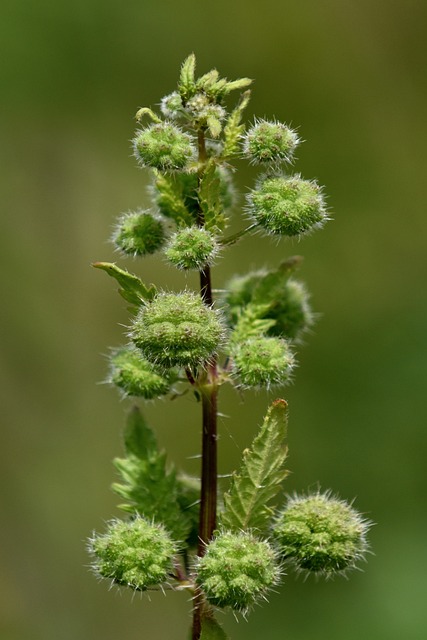THCA flower, the non-psychoactive form of cannabis, has garnered attention for its therapeutic properties, particularly as a natural anti-nausea compound. It interacts with the endocannabinoid system's CB1 receptors to effectively alleviate nausea, especially in instances like chemotherapy-induced nausea. The flower's unique blend of cannabinoids, terpenes, and flavonoids synergizes to produce these anti-emetic effects, making it a subject of scientific scrutiny for its potential to address nausea symptoms. Beyond anti-nausea benefits, THCA flower also exhibits anti-inflammatory, pain-managing, and mood-enhancing properties, positioning it as a significant addition to holistic health practices. The preliminary research on THCA flower extracts indicates their potential in offering a new avenue for anti-nausea treatment, particularly where current options are less effective or come with undesirable side effects. As studies continue, the therapeutic applications of THCA flower, especially its anti-nausea compounds, are being explored for broader healthcare use.
Discover the healing potential of THCA flowers, a natural source rich in anti-nausea compounds. This article delves into the therapeutic properties of THCA, a non-psychoactive cannabinoid found in hemp and cannabis plants. From understanding its science-backed benefits to mastering cultivation techniques for optimal potency, we explore how THCA flower can be integrated into your wellness routine for effective nausea relief. Join us as we navigate the intricacies of preserving THCA’s efficacy through proper harvesting and drying methods, and delve into the role of complementary terpenes in enhancing its anti-nausea effects. With a focus on safety, legal considerations, and practical usage, this comprehensive guide equips you with the knowledge to harness THCA flower’s full potential for wellbeing.
- Unveiling THCA Flower: A Natural Source of Anti-Nausea Compounds
- The Science Behind THCA's Anti-Nausea Properties
Unveiling THCA Flower: A Natural Source of Anti-Nausea Compounds

THCA flower, rich in tetrahydrocannabinolic acid (THCA), emerges as a natural source for anti-nausea compounds with potential therapeutic benefits. Unlike its psychoactive counterpart THC, THCA is non-psychoactive, making it an attractive option for those seeking relief from nausea without the mind-altering effects. Studies have indicated that THCA interacts with the body’s endocannabinoid system, particularly the CB1 receptors responsible for regulating nausea and vomiting, thus offering a natural alternative to conventional anti-nausea medications. The unique composition of THCA flower, including a variety of cannabinoids, terpenes, and flavonoids, contributes to its anti-emetic properties, making it a subject of growing interest in both scientific research and medical communities for its potential to alleviate symptoms associated with conditions like chemotherapy-induced nausea.
Furthermore, the anti-nausea compounds found in THCA flower are not limited to their effect on the gastrointestinal tract. They also exhibit a broad range of effects that can benefit overall wellness. These benefits extend to the alleviation of inflammation and pain, as well as the modulation of mood and stress responses. As a result, THCA flower is being explored for its role in holistic health approaches, offering a complementary strategy alongside conventional treatments to improve quality of life for those suffering from nausea and related symptoms.
The Science Behind THCA's Anti-Nausea Properties

Delta-9-tetrahydrocannabinol alcohol (THCA), which is the raw form of the well-known psychoactive compound THC, has garnered attention for its potential therapeutic benefits. THCA is found in raw cannabis flowers and possesses a unique profile of anti-nausea properties. Scientific research suggests that THCA interacts with the body’s endocannabinoid system through its receptors, particularly CB1 and CB2. This interaction can influence various physiological processes, including those related to nausea and vomiting. The anti-emetic effects of THCA are thought to stem from its ability to stimulate appetite and alleviate pain, which often accompany nausea. Preclinical studies have demonstrated that THCA can reduce chemotherapy-induced nausea in animal models, offering a promising avenue for further investigation into its application as an anti-nausea compound. The potential of THCA flower extracts to provide relief from nausea without the psychoactive effects of THC makes it a subject of growing interest among researchers and patients alike seeking alternative treatments for nausea, particularly in conditions where traditional antiemetics are less effective or have undesirable side effects. As such, the exploration of THCA’s anti-nausea properties continues to expand, with ongoing studies aimed at understanding its full potential within the therapeutic realm.
THCA flower tips serve as a natural source of anti-nausea compounds, offering a potential alternative for those seeking relief from nausea without synthetic treatments. The science behind THCA’s properties reveals its promising potential in this area, making it a subject of growing interest for researchers and patients alike. As legal and regulatory frameworks evolve, the therapeutic application of THCA could become more accessible, potentially carving out a significant role in holistic healthcare practices. Users considering THCA flower tips for anti-nausea effects should consult with healthcare professionals to determine its suitability for their individual health needs.
